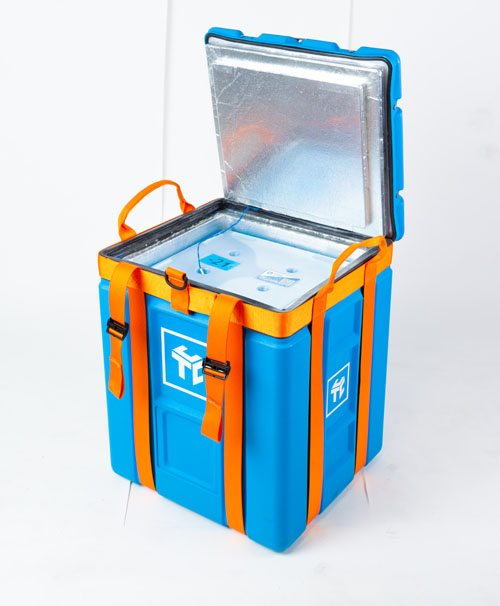The global clinical trials market is anticipated to be worth nearly $100 billion by 2030, according to recent forecasts from Fortune Business Insights.1
The UK, in response to this growth and influenced by regulatory measures such as those introduced by the MHRA, has undergone a substantial overhaul in trial regulation; this marks the most significant change in more than two decades and will result in a faster approval process for clinical trials.2
Such acceleration of trial approvals underscores the importance of reliable and efficient temperature-controlled solutions during clinical trial shipping.
And, given the high value, perishable nature and susceptibility to temperature changes and microbial contamination of clinical trial products, maintaining an ambient and secure environment during transportation is crucial.
In this context, it’s vital to invest in a clinical trial packaging solution, tailored specifically to smaller shipments with an optimal packaging-to-payload ratio, that’s still able to deal with challenging supply chains.
Matching the product to the container
Fundamentally, every container available on the market serves the same primary purpose — facilitating the delivery of pharmaceutical shipments while safeguarding the product from physical damage and temperature excursions.
However, notable distinctions exist among container suppliers, presenting pharmaceutical manufacturers with various decisions regarding thermal technology, materials, container design and Internet of Things (IOT) capability.
Although each option comes with its own set of pros and cons, what if we evaluate containers solely based on the packaging-to-payload ratio? Which solutions optimise volume and minimise environmental impact without compromising the container's essential function?
Complexities in clinical trial shipping
As clinical trials expand globally, those responsible for transporting such products face challenges in terms of maintaining temperature control while negotiating vast distances and diverse climates.
These issues are particularly pertinent when you consider remote locations. How do you deliver clinical trial materials safely when the local conditions might be far from ideal?
You need the same robustness of cold chain integrity to maintain internal temperatures and prevent damage in-transit as well as a solution that’s portable enough to ensure delivery wherever in the world it’s needed — which might be in a region where, for example, access to electricity is uncertain or non-existent.
In short, a container that strikes the optimum balance between high performance, durability and optimised size and weight is key.
However, for the manufacturer, all systems are required to pass through a rigid set of qualification stages to ensure they meet regulatory requirements, industry standards and expected performance, which is critical for the safety and quality of the drug product.
With such processes involving extensive documentation and testing, this can often consume significant time and internal resources.
Thus, to minimise time and expense, it is common for pharmaceutical companies to only validate a limited choice of containers. Realistically, though, this means that there could easily be a situation when these containers aren’t optimised for the product being shipped.
Shipping a half-empty box because smaller, more suitable-sized containers have not been validated (despite being available on the market) is one example. Or, more commonly, manufacturers opt for single-use solutions instead of those that support reverse logistics.
Although single-use containers offer convenience owing to their one-way nature, they inherently raise sustainability concerns by contributing to unnecessary waste.
In essence, addressing the complexities of clinical trial shipping requires careful consideration of container selection to ensure alignment with the specific needs of the product being shipped.
The good news is that pharmaceutical cold chain solution providers are always working to close the gap and help manufacturers to seamlessly match the right solution to the product … every time.
It’s worth understanding the latest innovations in product design and material choice to help move towards the optimum solution for clinical trial samples.
Robust design
Maintaining a consistent temperature is crucial during transit; but it's equally important to ensure that containers are tightly sealed for weatherproofing and washability.
This reduces the risk of microbial and bacterial contamination. However, durability shouldn't compromise manoeuvrability.
Protection doesn't have to mean weightiness. Innovative product design, such as utilising recyclable polyethylene foam strategically placed in vulnerable areas — such as the corner of the unit — shields against impact and shock during transportation.
This approach allows for a robust yet lightweight solution that can be easily handled by fewer cargo agents while still providing reliable thermal protection — even when tipped on the side.
Portable containers
Significant advancements have been made in recent years to ensure that the same level of product protection can be achieved within a smaller container size, making it ideal for applications such as clinical trials or “last mile” delivery.
This progress enables the creation of a robust, lightweight and easily manageable solution with consistent thermal protection and durability.
From a design standpoint, the container must strike an optimal balance between high performance, durability and optimised weight. Features such as a lightweight webbing system, as found on Tower Cold Chain’s KTEvolution container range, enhances strength and stability while simplifying manual handling.3
With up to 120 hours of performance, the KTEvolution is available in 26 and 57 L options and stands as Tower’s lightest, smallest solution, which can be carried by 1–2 people.

In line with Tower’s range of solutions, it’s available across a full temperature range and is ideal for the transportation of direct-to-patient and sample shipments that require an internal temperature of –60 to +20 °C.
With built in datalogging technology — provided by the likes of Elpro and Onset — to deliver active tracking and real-time confirmation of internal temperature and on-delivery sign-off, the KTEvolution has the potential to be fully connected with integrated smart technology solutions such as location, temperature, shock and impact monitoring.
Reusable versus single-use or semireusable
With a growing focus on sustainability in supply chain decisions, opting for fully reusable passive containers can significantly reduce a manufacturer's carbon footprint by keeping them in circulation for an extended period, thereby minimising the environmental impact of manufacturing.
It's crucial for reusable solutions to be robust, as discussed in the design considerations above, to endure years of transportation.
The evident advantage lies in the substantial reduction of packaging waste compared with single-use alternatives that are discarded after a single journey or semireusable containers that are prone to repairs or modifications.
Towards the optimum solution
In the field of shipping clinical trial samples, the ongoing innovation in the pharmaceutical cold chain sector ensures that you can opt for a solution that’s perfectly tailored to your requirements.
This choice promises an optimal mix of robust product protection and consistent performance, coupled with the added benefit of long-term reusability.
The ability to select smaller box sizes, which can maintain temperatures for more than 120 hours without electricity and can be manually handled for a truly global reach, further enhances the capabilities now available.
By integrating new technologies and partnering with specialised cold chain solution providers such as Tower Cold Chain, manufacturers of clinical trial products can enhance the resilience of their supply chains.
Amid increasingly stringent regulations, experts in cold chain management play a crucial role by facilitating faster qualification processes and ensuring rigorous quality assurance standards.
By working closely with manufacturers, cold chain providers are the ones driving the industry towards the most effective solutions to transport clinical trial shipments with confidence and reliability.
References
- www.fortunebusinessinsights.com/clinical-trials-market-106930.
- www.gov.uk/government/news/mhra-to-streamline-clinical-trial-approvals-in-biggest-overhaul-of-trial-regulation-in-20-years.
- www.towercoldchain.com/ktevolution-26/.

